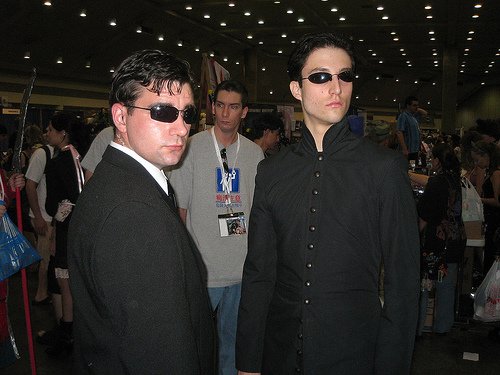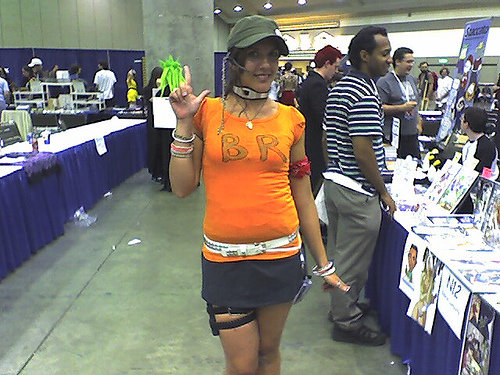Well, Otakon has passed and we’re safely back in San Diego, our long, multi-stage vacation across America finally over. After finishing up at the convention, we spent Sunday in D.C. so that my son could see the many amazing sights there. We started with the Capital and walked all the way to the Lincoln Memorial (“the place from Planet of the Apes”), taking in various monuments along the way. One of the challenges of raising a child who’s both American and Japanese is exposing him to the cultural knowledge Americans take for granted, George Washington chopping down the cherry tree and all that. I had my work cut out for me, explaining the history of the nation mainly through the presidents that appear on the U.S. currency and trying to impress upon him why archaic language like “four score and seven years ago” is important We capped off our day at one of my favorite places in the world, the Smithsonian Air & Space Museum, took in the great aeronautical achievements of the past century, went to the moon courtesy of IMAX, and did the requisite touching of the moon rock. It was a great memory.
I talked last time about what the idea of “freedom” might mean to the Japanese, at least the students I taught English to. In general Japan is what’s known as heiwa-boke (hay-WAH BOH-kay), roughly meaning “going soft in the head from too much peace.” Japan has spent the last six decades completely free of war, with the exception of peacekeeping efforts in Cambodia and now Iraq. I grew up with ideas from the American Revolution like “the tree of liberty, from time to time, must be replenished with the blood of patriots and tyrants” (Jefferson), but Kim Jung-il notwithstanding, Japan has very little in the way of external threats to its liberty that would make people think about what “freedom” might mean in the larger, philosophical sense. So “freedom” comes to mean the freedom to do the things they’re not allowed to do in Japan, like wear the clothes they want to school (almost all junior high and high schools have required uniforms), the freedom to drive or work a part-time job (forbidden for students), freedom to listen to rockabilly music, or freedom to imitate your heroes on Hollywood. I definitely feel lucky as an American to have a better idea of what “freedom” should really mean.
I’m always interested in Japanese who recognize the limitations of Japan’s more structured society and find ways around them. One person I knew had finally gotten into Aoyama University in Tokyo, a prestigious private school, after years of preparation and study. Once in the school, he found…nothing that interested him. It’s common for Japanese university students to study very hard to pass a school’s entrance exam, then play around for four years while they wait to graduate, and that’s what he saw happening. So he dropped out — how scandalous! — and restarted his university career in Oregon, enjoying a much broader education in the U.S. and perfecting his English in the process. America is very much an open plain, with little in the way of established social grooves that people feel they must move through, as in Japan, and this suited my friend very well. One of the famous sayings in Japan is deru kui wa utareru, or “the standing nail will be hammered down,” meaning that people who stick out will usually be brought into line with social norms in the end. If you were to make a list of Japanese who have done really outstanding things over the past century, I’m sure you’d see that most or all of them were very much “standing nails.” I’m sure my friend will do great things in the future.
We’re rolling out the first of our new improvements to the J-List website, a new search feature that includes weighted search results that should be more accurate. We’re still working on the system, so if you have any feedback, please pass it along to us. Look for more improvements to J-List in the coming weeks and months!
Do you have a website? Do you like J-List’s style? If so we hope you’ll consider the Friends of J-List, our little program that makes it worth your while to link to J-List or JBOX.com. You have complete control over what products or categories you link to, and can check all stats in real-time. For more information, check out our info page.
















